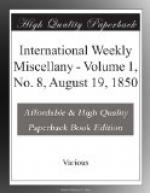“Washington Irving, at the request of the publishers, contributed a very interesting letter to themselves, directing public notice to the value of this edition. He pays also a hearty and deserved tribute, not only to the genius of Campbell, but to his many excellencies and kindly specialities of character. The author of “Hohenlinden,” and the “Battle of the Baltic” stands in need of no man’s praise as a lyric poet—but this sort of testimony to his private worth is grateful and well-timed. Here is an interesting passage from Mr. Irving’s introductory communication. He is alluding to Campbell’s fame and position, when he himself first made Campbell’s acquaintance in England.
“’I had considered the early productions of Campbell as brilliant indications of a genius yet to be developed, and trusted that, during the long interval which had elapsed, he had been preparing something to fulfill the public expectation; I was greatly disappointed, therefore, to find that, as yet, he had contemplated no great and sustained effort. My disappointment in this respect was shared by others, who took the same interest in his fame, and entertained the same idea of his capacity. ’There he is cooped up in Sydenham,’ said a great Edinburgh critic to me, ’simmering his brains to serve up a little dish of poetry, instead of pouring out a whole caldron.’
“’Scott, too, who took a cordial delight in Campbell’s poetry, expressed himself to the same effect. ‘What a pity is it,’ said he to me ’that Campbell does not give full sweep to his genius. He has wings that would bear him up to the skies, and he does now and then spread them grandly, but folds them up again and resumes his perch, as if afraid to launch away. The fact is, he is a bugbear to himself. The brightness of his early success is a detriment to all his future efforts. He is afraid of the shadow that his own fame casts before him.’
“’Little was Scott aware at the time that he, in truth, was a ‘bugbear’ to Campbell. This I infer from an observation of Mrs. Campbell’s in reply to an expression of regret on my part that her husband did not attempt something on a grand Scale. ‘It is unfortunate for Campbell,’ said she, ’that he lives in the same age with Scott and Byron.’ I asked why. ‘Oh,’ said she, ’they write so much and so rapidly. Now Campbell writes slowly, and it takes him some time to get under way; and just as he has fairly begun, out comes one of their poems, that sets the world agog and quite daunts him, so that he throws by his pen in despair.’
“’I pointed out the essential difference in their kinds of poetry, and the qualities which insured perpetuity to that of her husband. ‘You can’t persuade Campbell of that,’ said she. ’He is apt to undervalue his own works, and to consider his own lights put out, whenever they come blazing out with their great torches.’




